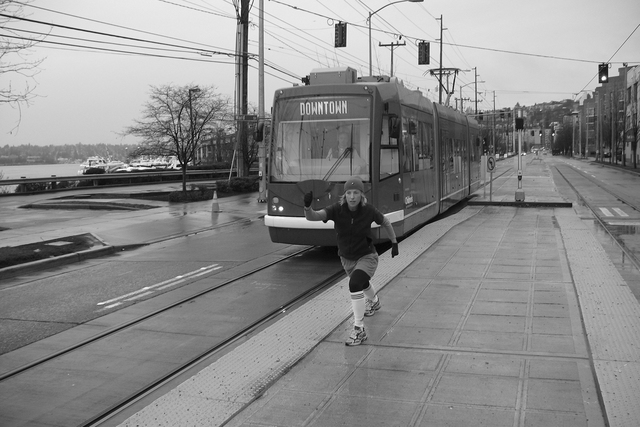Forget about Howard Schultz. Forget about the Sonics’ rich out-of-town owners and their equally rich athlete-employees who get to play a children’s game for a living. Forget about Wally Walker and Chris Van Dyk. Forget about whether public subsidies for pro sports franchises are fair or ethical. Forget about sky-high ticket prices and luxury boxes that are inaccessible to the working stiff.
And think about fun.
If Margarita Prentice were to design a marketing campaign to support the Sonics’ quest for stadium funding in Olympia, “fun” would be the theme. “Any community is entitled to have fun,” says Prentice, a 75-year-old former nurse who, as chair of the state Senate’s powerful Ways & Means Committee, is easily the Sonics’ most important legislative ally heading into the 2007 session. “And I want my community to have a whole lot of fun.”
Prentice, who religiously attended games for 20 years before relinquishing her Sonics season tickets in the mid-’90s when her husband fell gravely ill, supported finding a Seattle-based arena solution in the Legislature last year—a somewhat disorganized, Johnny-come-lately effort that ultimately stalled. Her district includes Renton, which contains a plot of surplus Boeing land that is believed to still be in the running as a potential site for the Sonics’ new arena. (The leading contender is thought to be a piece of land in Bellevue.)
Meanwhile, the city of Seattle is completely shut out of this contest after the easy passage of I-91—the Chris Van Dyk–backed initiative that effectively prohibits the city from entering into any more deals with professional sports teams. “The [29] sites we’re looking at are all outside the city limits,” confirms Seattle-based public relations consultant Jim Kneeland, whose services have been retained by the new Sonics ownership group, headed by Clay Bennett of Oklahoma City.
“I think Seattle is the big loser in this one. I never want to hear another word about Tim Eyman if they can slavishly follow what some guy from Bainbridge Island wants to do,” says Prentice, referring to Bainbridge resident Van Dyk. “I think they’re being narrow about a lot of things. Why are we so obsessed with people who are capable of buying teams? Why are we so focused on them?”
When Prentice talks pro sports economics, she speaks in terms of the blue-collar, administrative, and service-industry jobs that are at stake—pointing to the fact that many concession workers shuttle from one stadium to the next in a seasonal manner similar to migrant workers. She also talks about the “trickle-down effect that you can’t quantify” in restaurants and bars where people gather regularly to watch their favorite team.
Speaking Spanish to the wait staff over breakfast at the Yankee Grill in Renton, the senator says, “Think about all the beer we’re selling. I love to see waitresses getting tipped.”
So does the Washington Restaurant Association, which has already aligned itself with the Sonics as they work toward a goal of presenting a site and funding package to the Legislature shortly after it convenes Jan. 8. Last year, the WRA couldn’t come to terms with Schultz, who wanted a proposed 0.5 percent restaurant sales tax earmarked for the arena to continue indefinitely, while the WRA insisted it end after 2015. The WRA felt that the $60 million the tax would generate for the new Sonics arena was a sufficient contribution. Bennett agrees, which is why, when asked if the WRA was on board with the Sonics’ imminent push in Olympia, WRA Government Affairs director Trent House replies, “Absolutely. Obviously, we have members that benefit a great deal from having the Sonics in town.”
“Usually, on an issue like this, it takes more than a year to push it through,” says Sonics consultant Kneeland. “Our goal is to walk into the legislative session with the support of the industries that will be taxed to pay for this arena. The main one is the restaurant industry. They volunteered to be part of the solution, which is 180 degrees different than last year, when Schultz wouldn’t compromise.”
Also key, say Prentice and Kneeland: the Sonics’ willingness to use union crews to build the new arena and sign off on what’s known as “card check neutrality,” which guarantees that if over half of a given workforce wants to unionize, their employer will allow them to do so. Yet, for all their diligence to date, Bennett’s group has failed to make significant headway with a potentially key ally: 4Culture, King County’s all-encompassing arts and culture commission, which, after 2012, will no longer have access to proceeds from a lodging tax that was instituted to help pay for the (now-demolished) Kingdome, which opened in 1976.
“The prescribed use by 4Culture expires in 2012,” explains 4Culture lobbyist Mike Woodin. After that, 4Culture’s portion of the tax will go to service debt on Qwest Field. “We will work with anybody who’s willing to explore restoring [that] funding.”
Schultz’s group was willing to do just that in 2006. Hence, 4Culture struck up a “marriage of convenience” with the Starbucks founder and his partners. “They were very good to us,” recalls 4Culture’s executive director, Jim Kelly. “But we also realized this was going to be an uphill struggle.”
Kneeland says the Sonics “have been working with the people at 4Culture and hope to have them in a supportive position when we start session.” To which Kelly replies: “No they haven’t. Their lobbyist has had one conversation with our lobbyist. We’re leaving our options open and are prepared to go any number of directions.”
Yet Kelly acknowledges that an alliance with the Sonics could be a mutually advantageous proposition, as a portion of the service taxes the Sonics will inevitably seek might be designated to fill the void left by the disappearance of lodging tax funds from 4Culture’s budget. If they play their cards right, Sen. Prentice says she’s “real confident” the Sonics will eventually get what they want: “One of the things that happens with good legislation is when people start to believe it’s going to happen, there’s no political fallout.
“I’m a New Deal Democrat,” adds Prentice, who grew up in San Bernardino, Calif., during the Depression. “Arts and recreation, that’s my belief.”
And while the diminutive Prentice considers baseball to be her first love, it’s evident that she still carries a flaming hot torch for James Naismith’s game.
“It’s so immediate, so fast,” she says. “It really is like watching ballet. It’s so beautiful. I still remember the first alley-oop I saw—to [’79 championship guard] Dennis Johnson. I was heartsick when he left.”








